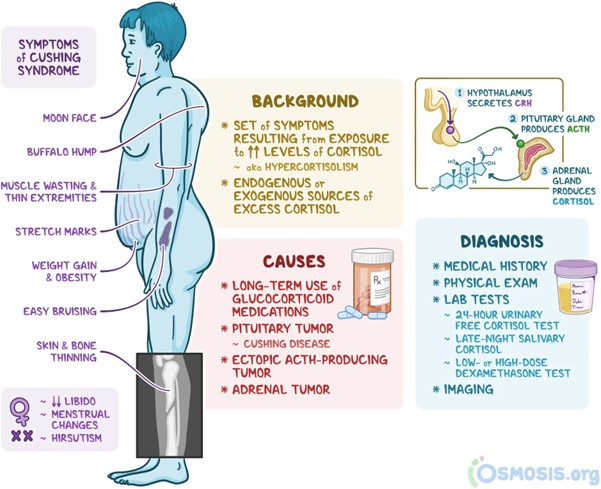A patient is admitted for treatment of Cushing's syndrome. The nurse correlates this disease process to which alteration in endocrine function?
Decreased cortisol level.
Elevated glucocorticoid level.
Decreased aldosterone secretion.
Elevated insulin secretion.
The Correct Answer is B
Cushing's syndrome is a disorder characterized by excessive production or prolonged exposure to high levels of glucocorticoids, particularly cortisol. This can occur due to various reasons, such as the use of corticosteroid medications or overproduction of cortisol by the adrenal glands. Elevated glucocorticoid levels result in a variety of clinical manifestations associated with Cushing's syndrome, including weight gain, central obesity, muscle wasting, thinning of the skin, easy bruising, and impaired glucose metabolism.
It's important to note that Cushing's syndrome can have different underlying causes, such as adrenal tumors, pituitary tumors, or ectopic ACTH production. Regardless of the cause, the common feature in Cushing's syndrome is the excessive glucocorticoid levels, which contribute to the signs and symptoms of the condition.

Nursing Test Bank
Naxlex Comprehensive Predictor Exams
Related Questions
Correct Answer is D
Explanation
Celiac disease is an autoimmune disorder characterized by an abnormal immune response to gluten, a protein found in wheat, barley, and rye. When individuals with celiac disease consume gluten, their immune system reacts by damaging the lining of the small intestine, specifically the villi. The damaged villi are unable to effectively absorb nutrients from food, leading to malabsorption and a variety of symptoms.

Correct Answer is C
Explanation
Morphine is a potent opioid analgesic that can depress the respiratory system. Respiratory depression is a potential adverse effect of morphine, and it is essential for the nurse to monitor the patient's respiratory rate regularly to ensure adequate oxygenation and prevent respiratory complications.
By checking the respiratory rate, the nurse can assess if the patient is breathing adequately and detect any signs of respiratory depression. If the respiratory rate is significantly decreased or the patient shows signs of respiratory distress (e.g., shallow or irregular breathing), immediate intervention is necessary to address the situation promptly.
Whether you are a student looking to ace your exams or a practicing nurse seeking to enhance your expertise , our nursing education contents will empower you with the confidence and competence to make a difference in the lives of patients and become a respected leader in the healthcare field.
Visit Naxlex, invest in your future and unlock endless possibilities with our unparalleled nursing education contents today
Report Wrong Answer on the Current Question
Do you disagree with the answer? If yes, what is your expected answer? Explain.
Kindly be descriptive with the issue you are facing.
